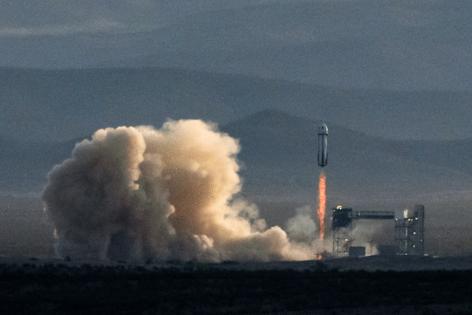Commentary: The Blue Origin flight reminds us that there is no feminism without environmentalism
Published in Op Eds
The recent Blue Origin space mission, and its all-female crew, faced widespread criticism for their rocket’s climate impact. Although the purported mission of Blue Origin is to “restore and sustain Earth,” a few minutes in space is known to release more planet-warming carbon dioxide than 1 billion people will in their entire lifetime.
Experts predict an increase in space tourism over the coming decades, potentially accelerating global warming in a world already struggling to combat its effects.
The historic all-female space crew was assembled to promote female representation in space — a worthy undertaking since nearly 90% of the over 700 people who have traveled to space are men. But the Blue Origin flight also showed the world that privileged women can increasingly, thanks to space tourism, pollute Earth just as easily as wealthy men have for decades. Despite the critical need for women’s equality, the effects of climate change are far from gender neutral.
I teach about the health impacts of climate change and have taken care of many women during my 15 years as a primary care physician. The unique physiology of women and social roles and societal expectations place women at disproportionately higher risk from climate-fueled disasters and warming temperatures.
Reproductive stages such as menstruation, pregnancy and nursing increase women’s climate vulnerability. The heightened metabolic and/or nutritional demands during these times make women more dependent on resources such as food and water that are threatened by climate change and extreme weather events. Increases in atmospheric carbon dioxide may worsen dietary deficiencies in reproductive-age women by reducing crop levels of critical nutrients such as iron, folate and protein.
Extreme heat, increasingly a norm rather than an exception, is particularly harmful for pregnant women, raising their likelihood of preterm delivery and high blood pressure. Higher temperatures also increase preterm birth by increasing levels of the harmful air pollutant called ground-level ozone. Because pregnant women have faster breathing rates, they are also more susceptible to going into preterm labor and having babies with low birth weight from inhaling wildfire smoke.
Despite the incremental progress toward gender equality in U.S. homes, women continue to manage disproportionate amounts of caregiving and household activities. Climate change, a known “threat multiplier,” is poised to worsen existing inequities. The COVID-19 pandemic, despite being a different type of crisis, provided a sneak preview of this exacerbation of inequities. From February 2020 to January 2022, 1.1 million women left the labor force — accounting for 63% of all jobs lost. This disparity was even greater for mothers.
Given the continued disparities of labor in the home, women face unique challenges during and after extreme weather events. In the weeks following Hurricane Maria, millions of Puerto Ricans were left without power and drinkable water. Women washed laundry by hand and collected and boiled rainwater for bathing and consumption — adding hours to their daily routines. The physical and emotional toll on Puerto Rican women during this time was immeasurable.
This is not to say that women shouldn’t continue participating in important space missions. Women have made critical contributions to space science and benefited from its findings. Several environmentally beneficial inventions, including solar panels, satellite detection of wildfires and energy efficient insulation, are the result of innovations related to space travel.
Yet the Blue Origin flight is a good reminder that there is no feminism without environmentalism. When Eleanor Roosevelt said women “cannot refuse to acknowledge” their differences from men, she also highlighted those differences as the basis of women’s activism. Women certainly bear the brunt of the climate crisis, but they are also at the front line of solutions.
Successful women’s activism has always been grounded in collaboration and inclusion. Time and time again, we see that when women are lifted out of poverty and given equal rights, all of society is uplifted. When women are part of decision-making, solutions are more effective and inclusive. Protecting the planet is no exception because racism, poverty and patriarchy worsen the impact of climate change for everyone on it.
Yes, wealthy women will increasingly be able to visit space as tourists, but should they, given the price paid by environmental impacts on other women? Because the reality is, most women won’t be able to escape climate change on a rocket ship.
Women have changed the world before, and they can do it again, but they aren’t going to do it by taking day trips into outer space. To protect our communities and save the one planet we have will take unity, empathy, collaboration and cooperation beyond class divides.
There is no better time than now to start.
____
Dr. Sheetal Khedkar Rao is an internal medicine physician and assistant professor of clinical medicine at the University of Illinois at Chicago. She is on the board of Illinois Clinicians for Climate Action and a public voices fellow through The OpEd Project.
_____
©2025 Chicago Tribune. Visit at chicagotribune.com. Distributed by Tribune Content Agency, LLC.

























































Comments